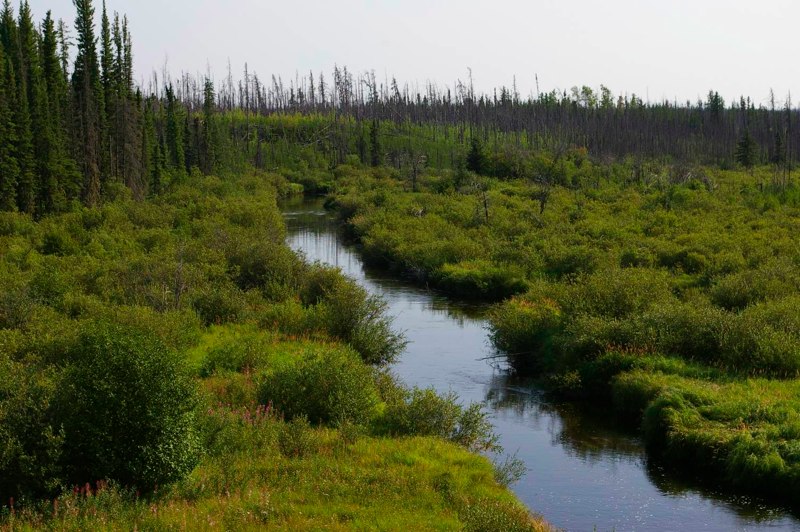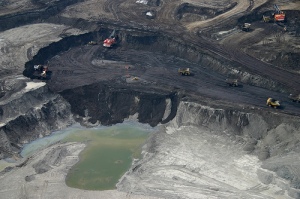Avatar, Canadian-born director James Cameron’s blockbuster, didn’t sweep the Oscars as some expected after getting 9 nominations, but a coalition of 50 indigenous and environmental groups took advantage of Avatar’s high profile to run an ad in the entertainment magazine Variety just prior to the award show earlier this month.
 The full-page ad draws the parallels between the film and what is happening in right now in the Alberta tar sands, saying the oil sands are:
The full-page ad draws the parallels between the film and what is happening in right now in the Alberta tar sands, saying the oil sands are:
“Where Indigenous Peoples in Canada are endangered by toxic pollution and future oil spills.”
“Where Shell, BP, Exxon, and other Sky People are destroying a huge ancient forest. Where giant Hell trucks are used to mine the most polluting, expensive unobtanium oil to feed America’s addiction.”
Micheal Marx, head of U.S-based Corporate Ethics International, one of the groups that bought the ad stated: “There are people living the Avatar storyline around the world, and we’re grateful for the opportunity to bring attention to that.”
“The tar sands have become the symbol of Canadian inaction on climate change,” said John Bennett, executive director of Sierra Club Canada, another one of the groups that backed the ad. “Avatar is about industrialists wanting to take every last resource and use it without regard for the future, or for those who live nearby. That’s very synonymous with what’s happening with the tar sands.”
Cameron was born in Kapuskasing, Ontario, boreal forest country – the same forest that is being destroyed by the oil sands development. He has been outspoken about the movie’s message. “Avatar asks us all to be warriors for the Earth,” he said recently. “This beautiful, fragile, miracle of a planet that we have right here is our land. Not ours to own, but ours to defend and protect.”
Oil producers defended their industry, calling the oil sands “responsible energy” as opposed to the ad, which they claimed was “irresponsible”.
“If you look at the history of the oil sands, we have had constructive engagement with the aboriginal people for more than 40 years,” spokesperson Jane Annesley said.
Below are some First Nation responses to the oil industry, from the Sierra Club Canada website:
“We used to be able to drink water directly from Beaver Lake and it didn’t hurt us. We can no longer do that, and we can no longer make a traditional way of life in our home territory because of the tar sands developments. The oil companies can phrase it any way they like but no one has ever not dug for oil because of us and we don’t find the consultation process meaningful.”
Ron Lameman, Beaver Lake Cree Nation
“While First Nations have been in the region for more than 10,000 years, major tarsands companies like Syncrude and Suncor have been leasees in our traditional homelands for only a fraction of that time, 40 years to be exact, I would question CAPP’s take on characterizing us as “their” neighbours. I am a member and former Chief of the Mikisew Cree First Nation, the largest First Nation in the Athabasca tarsands and today our First Nation has no “formal” relationship with Syncrude or Suncor, that after 40 years is not something I would characterize as good corporate responsibility. They actually have both recently been applying pressure to the First Nations in our community of Fort Chipewyan for speaking out publicly about environmental, health and other issues that we have observed with the unrelenting pace of tarsands development in the past few years.
While we do have First Nations members employed in the industry and First Nation owned companies as contractors to tarsands companies, there is a growing concerns by First Nations in the region who question our involvement in the industry.
First Nations especially the Mikisew Cree have recently intervened in several hearings for the multibillion dollar project applications and have recommended a moratorium on many of these applications until many of our issues were mitigated or science has caught up to the multitude of questions. So I would question CAPP and other oil companies suggesting
that we are their “full partners and stakeholders” endorsing their actions.
Having productive relationships with the oil and gas sector and endorsing their licences to operate is far from the truth from a First Nation perspective.”
George Poitras, Mikisiew Cree
“CAPP does not speak for aboriginal people; we will speak for ourselves. More and more of us are saying we don’t want your tar sands, we don’t want your pipelines, and we don’t want your oil tankers.
We aren’t interested in being partners with an industry association that has shown such blatant disregard for our basic human rights. CAPP claims to address our “economic, social and cultural needs,” but when our need is for them to stay out of our territories, it’s only their own economic needs that get addressed.”
David Luggi, Chief of the Carrier-Sekani Tribal Council
To take a stand against Canada’s dirty oil industry:
Go to Lovewinter.org to send a message to President Obama to stop the spread of the dirty oil sands oil to the U.S.
Go to www.tarnation.ca to play Tarnation, a video game that lets you blast PM Stephen “Tarper” and Micheal “Oil Rignatieff” with oil, sending them right out of the tar sands – and then send them an email to them encouraging them to change their policy.
For more info check out these links:
Sierra Club Canada – Tar Sands
Indigenous Environmental Network
“Money Spent on Tar Sands Could Decarbonize Western Economies”
Dirty Oil Sands.org
U.S. Campaign to separate oil and state






